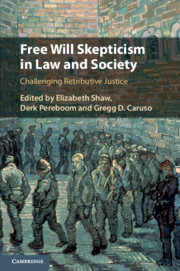Book contents
- Free Will Skepticism in Law and Society
- Free Will Skepticism in Law and Society
- Copyright page
- Contents
- Contributors
- Chapter 1 Free Will Skepticism in Law and Society: An Overview
- Part I On the Practical Implications of Free Will Skepticism
- Chapter 2 Free Will Denial and Deontological Constraints
- Chapter 3 Free Will Skepticism and Its Implications: An Argument for Optimism
- Chapter 4 Beyond the Retributive System
- Part II Alternatives to Retributive Punishment
- Part III Free Will Skepticism and the Criminal Justice System
- Index
- References
Chapter 3 - Free Will Skepticism and Its Implications: An Argument for Optimism
from Part I - On the Practical Implications of Free Will Skepticism
Published online by Cambridge University Press: 26 August 2019
- Free Will Skepticism in Law and Society
- Free Will Skepticism in Law and Society
- Copyright page
- Contents
- Contributors
- Chapter 1 Free Will Skepticism in Law and Society: An Overview
- Part I On the Practical Implications of Free Will Skepticism
- Chapter 2 Free Will Denial and Deontological Constraints
- Chapter 3 Free Will Skepticism and Its Implications: An Argument for Optimism
- Chapter 4 Beyond the Retributive System
- Part II Alternatives to Retributive Punishment
- Part III Free Will Skepticism and the Criminal Justice System
- Index
- References
Summary
This chapter considers the practical implications of free will skepticism and discusses recent empirical work that has just begun to investigate the matter. It argues that there are good philosophical and empirical reasons for thinking that belief in free will, rather than providing the pragmatic benefits many claim, actually has a dark side; i.e., it is too often used to justify punitive excess in criminal justice, to encourage treating people in severe and demeaning ways, and to excuse and perpetuate social and economic inequalities. After addressing recent empirical findings in social psychology that purport to show that diminishing one’s belief in free will increases antisocial behavior – findings that are overblown and questionable – the chapter discusses contrary findings in moral and political psychology that reveal interesting and troubling correlations between people’s free will beliefs and their other moral, religious, and political beliefs. It concludes that we would be better off without the notions of free will and just deserts.
Keywords
- Type
- Chapter
- Information
- Free Will Skepticism in Law and SocietyChallenging Retributive Justice, pp. 43 - 72Publisher: Cambridge University PressPrint publication year: 2019
References
- 9
- Cited by

